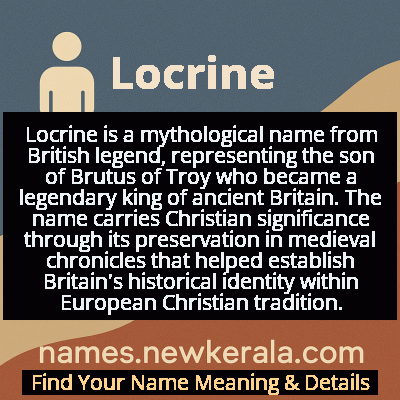Locrine Name Meaning & Details
Origin, Popularity, Numerology Analysis & Name Meaning of Locrine
Discover the origin, meaning, and cultural significance of the name LOCRINE. Delve into its historical roots and explore the lasting impact it has had on communities and traditions.
Name
Locrine
Gender
Male
Origin
Christian
Lucky Number
4
Meaning of the Name - Locrine
Locrine is a mythological name from British legend, representing the son of Brutus of Troy who became a legendary king of ancient Britain. The name carries Christian significance through its preservation in medieval chronicles that helped establish Britain's historical identity within European Christian tradition.
Locrine - Complete Numerology Analysis
Your Numerology Number
Based on Pythagorean Numerology System
Ruling Planet
Uranus (Rahu)
Positive Nature
Strong sense of order, loyal, practical, and disciplined.
Negative Traits
Stubborn, overly serious, rigid, and prone to feeling restricted.
Lucky Colours
Blue, gray.
Lucky Days
Saturday.
Lucky Stones
Blue sapphire.
Harmony Numbers
1, 7, 8.
Best Suited Professions
Managers, engineers, accountants, organizers.
What People Like About You
Dependability, discipline, practicality.
Famous People Named Locrine
Locrine (Legendary)
Mythological King
Legendary son of Brutus of Troy who ruled Loegria (England) and appears in Geoffrey of Monmouth's Historia Regum Britanniae
Locrine (Literary)
Literary Character
Title character in the play 'Locrine' (1595) attributed to William Shakespeare, depicting his tragic love story and eventual suicide
Locrine (Historical Reference)
Legendary Figure
Appears in multiple medieval British chronicles as part of the foundation myth of Britain, establishing early British royal lineage
Name Variations & International Equivalents
Click on blue names to explore their detailed meanings. Gray names with will be available soon.
Cultural & Historical Significance
The tragic tale of Locrine's love for Estrildis, his betrayal of his wife Gwendolen, and his eventual death at the hands of his wife's forces has been interpreted as an allegory for the political struggles and dynastic conflicts in early British history. This mythological narrative served to provide Britain with an ancient, prestigious lineage comparable to other European nations' foundation myths, while also exploring themes of loyalty, betrayal, and the consequences of passion overriding duty.
Extended Personality Analysis
Based on the mythological accounts and literary portrayals, individuals named Locrine are often associated with complex personality traits marked by both noble qualities and tragic flaws. They tend to be charismatic leaders with strong romantic inclinations, possessing the courage and determination to pursue their desires regardless of consequences. However, this passionate nature often leads to impulsiveness and poor judgment in personal relationships. The legendary Locrine demonstrates loyalty to his romantic ideals but shows weakness in political alliances and marital commitments.
Those bearing this name might be perceived as having a tragic hero archetype—ambitious and visionary yet ultimately undermined by their own emotional vulnerabilities and inability to balance personal desires with public responsibilities. This creates a personality profile of someone who inspires both admiration and pity, capable of great achievements but prone to self-destructive choices when driven by passion. The name suggests a person torn between duty and desire, with the potential for both glorious success and dramatic downfall.
Modern Usage & Popularity
In contemporary times, Locrine remains an exceptionally rare given name, primarily used in academic, literary, or historically-minded families seeking unique mythological names. The name has never appeared in modern popularity charts and is considered an obscure choice even among classical names. Its usage is largely confined to Britain, particularly among families with interest in Arthurian legends or early British history. The name occasionally appears in historical fiction and fantasy literature as a character name, maintaining its connection to British mythological traditions. In the 21st century, it might appeal to parents seeking distinctive names with deep historical roots, though its tragic associations and unfamiliar sound limit its widespread adoption. There are no discernible popularity trends as the name remains consistently rare across generations.
Symbolic & Spiritual Meanings
Locrine symbolizes the complex interplay between destiny and personal choice, representing the tragic hero archetype in British mythology. The name carries connotations of foundational leadership tempered by fatal romanticism, embodying the tension between public duty and private desire. Symbolically, Locrine represents Britain's ancient claim to classical ancestry and the nation's struggle to establish its identity through mythological narratives. The story of his reign and downfall serves as a metaphor for the inevitable consequences of broken vows and the destructive power of passion when unchecked by wisdom. In a broader sense, the name evokes themes of inheritance, territorial division, and the weight of ancestral legacy, making it symbolic of both the glory and burden of leadership that can be compromised by personal weaknesses.

